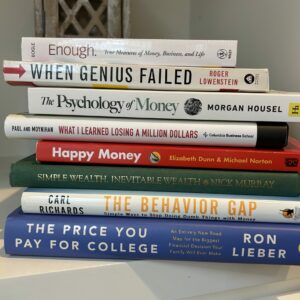 All our opinions and viewpoints around spending, investing, and savings have been curated by our life experiences. Real-life money decisions are directly linked to what we’ve seen and heard, and the stories told by our friends and family.
All our opinions and viewpoints around spending, investing, and savings have been curated by our life experiences. Real-life money decisions are directly linked to what we’ve seen and heard, and the stories told by our friends and family.
Books can teach us a lot about finance. More can be learned with cash in our account and choices in front of us, what will we do? Pay off or increase debt, inflate reserves, deplete savings, invest, spend, procrastinate, some of the above, perhaps all the above?
Personal finance is all about behavior. Much of our behavior, both good and bad, is linked to past lessons with money and how we define what it means to us. Personal finance is, well, personal. Each investor outlines what enough means, how they spend their cash, along with balancing income and debt responsibilities.
When we were younger, we watched our parents manage various financial decisions which had a lasting impact on us. Our belief system around cash, spending, and debt can be attributed to what we viewed firsthand, even if we weren’t paying attention. I believe these opinions and viewpoints are absorbed into our subconscious and drive a lot of our decisions today. Regardless of your financial past, all investors can make better financial decisions now, here’s how.
A good starting point is removing misconceptions about personal finance. More is not better or the answer to your cash and investment challenges. More doesn’t produce happiness, nor does it guarantee security. A large income doesn’t mean you’re wealthy. A moderate income doesn’t limit your independence.
So, what does matter? Investors who follow a process and have a belief system they can lean on in all markets, contracting and expanding, are able to save, invest, and spend with more confidence. Belief systems are rooted in fundamental principles that do not change regardless of economic news.
These values influence how one oversees their cash, addresses taxes, and decides where investments should be made. A strong belief system is optimistic about the future regardless of all the uncertainty that surrounds us today. An investor who accepts optimism as the only realism is better prepared for what comes next.
How does an investor create their own belief system? You can do this on your own by reading books, spending your cash, and investing. The results from these activities will shape your thinking. I believe the most efficient way to create, maintain, and expand a belief system is by working with a financial planner.
Investors who partner with a professional tend to create more time for themselves. This allows you to be present with your family, business, relationships, and health. Do you have to work with a financial professional? No, I don’t think so. There may come a time, however, when leveraging complexity, recordkeeping, and strategy by delegating to a planner is completely worth it. Some recognize they could do the job themselves, and this route does have some merit. But in my opinion, it also comes with a cost. When trying to manage everything on your own, the stresses of life can build up and something eventually has to give.
When that happens, most people will prioritize family and friends, vacation planning, and work above managing financial decisions. Why? It’s easier and more immediate to help others or do your job near term than thinking longer term about financial habits. Having a vested partner who keeps you accountable can make a positive difference in your life regardless of what’s happening in the moment.
Personal finance often takes the back seat to other priorities when you have unlimited time and opportunities in front of you. However, when you strategize about repurposing your time by giving up the stability of an earned income, life gets real quick. How do you manage volatility, risk, with an eye on sustainable spending for decades to come? Those investors who are collaborating with a planner likely have the answers.
A relationship built on trust, acceptance, and ongoing communications creates a healthy environment where beliefs can grow and flourish. A planner’s value is not in the answers they provide so much as in the questions they ask. It’s not about product solutions, or timing transactions, or the rate of return your portfolio generates. Frankly, it’s not really about investments either. It’s about making better decisions now despite the challenges you face.
Making the most of your possibilities is all about behavior. Accepting nudges in the right direction from someone who cares may get you closer to what you want. Mastering your cash flow is the key to personal finance at all ages and wealth spectrums.
Want to learn more? Here’s some of my favorite books on personal finance including lessons learned from some epic mistakes.
Enough. True Measures of Money, Business, and Life by Jack Bogle
When Genuis Failed, the Rise and Fall of Long Term Capital Management by Roger Lowenstein
The Psychology of Money, Timeless Lessons on Wealth, Greed, and Happiness by Morgan Housel
What I Learned Losing a Million Dollars by Jim Paul & Brendan Moynihan
Happy Money, The Science of Happier Spending by Elizabeth Dunn & Michael Norton
Simple Wealth, Inevitable Wealth by Nick Murray
The Behavioral Gap, Simple Ways to Stop doing Dumb Things with Your Money by Carl Richards
The Price You Pay for College, An Entirely New Road Map for the Biggest Financial Decision Your Family Will Ever Make by Ron Lieber
Advisory services through Cambridge Investment Research Advisors, Inc., a Registered Investment Advisor. Cambridge and Flowerstone Financial are not affiliated. Cambridge does not offer tax or legal advice.
1900 Reston Metro Plaza, Suite 600
Reston, Virginia 20190
Give Ryan a Call: 571-489-7181
Give Taylor a Call: 571-489-7186
